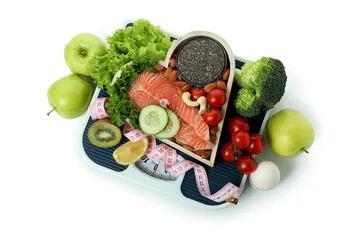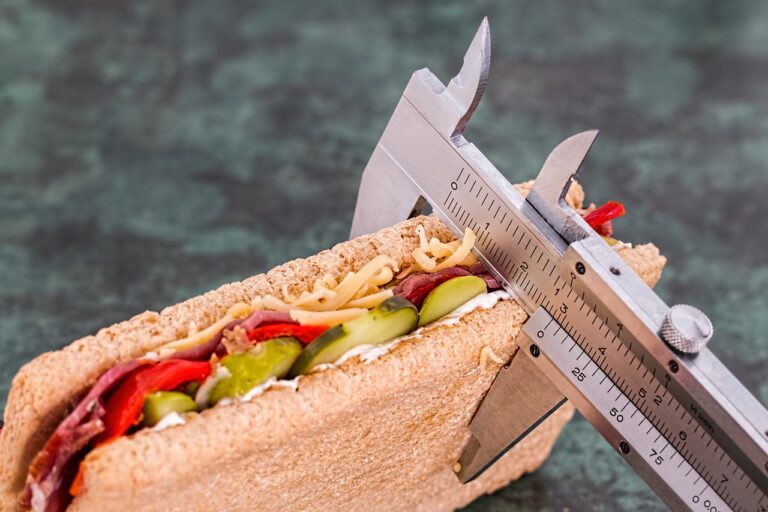Ramadan, a holy month of fasting and reflection, brings with it a unique opportunity to nourish your body and spirit. While abstaining from food and drink during daylight hours can be challenging, it can also be a catalyst for positive dietary changes.
This article explores a Ramadan diet plan for weight loss that prioritizes both spiritual growth and physical well-being. We’ll debunk the myths surrounding diet plans during Ramadan, guide you towards healthy iftar for weight loss options, and provide you with a sample meal plan to kickstart your journey
Why Prioritize a Healthy Ramadan Diet?
Ramadan is a sacred time for spiritual reflection, prayer, and community. But beyond the religious significance, it also presents a unique opportunity to nourish your body and cultivate healthy habits. While the act of fasting itself offers a chance to cleanse and reset, focusing on a healthy Ramadan diet can unlock a multitude of benefits that extend far beyond the month itself.
Improved Gut Health: During Ramadan, your digestive system takes a break from its usual routine. A healthy Ramadan diet plan for weight loss that prioritizes light, easily digestible meals during suhoor (pre-dawn meal) and iftar (evening meal) can actually improve your gut health in the long run. These gentle meals allow your digestive system to gradually ease back into action, promoting a healthy balance of gut bacteria.
Enhanced Energy Levels: Feeling sluggish during a long fasting day can be a real struggle. However, a healthy iftar for weight loss packed with slow-releasing carbohydrates and lean protein sources is a game-changer. These foods provide sustained energy throughout the night, keeping you feeling vibrant and focused for prayers, taraweeh prayers, and spending time with loved ones. No more energy crashes to disrupt your spiritual journey!
Weight Management and Beyond: Ramadan can be a catalyst for positive dietary changes that benefit you well beyond the month. By making conscious food choices during suhoor and iftar, you can cultivate habits that support weight loss and overall well-being. Learning to listen to your body’s hunger cues, manage portion sizes, and prioritize whole foods can set the stage for a healthy lifestyle that continues long after the Eid celebrations.
Think of a healthy Ramadan diet plan for weight loss as a gift to yourself. It’s a way to honor your body’s needs while strengthening your spiritual connection. By prioritizing your well-being, you’ll be better equipped to fully experience the blessings of Ramadan and emerge from the experience feeling renewed and empowered.
A Sustainable Approach to Weight Loss During Ramadan:
Ramadan is a time for spiritual reflection, self-discipline, and strengthening your connection with Allah (SWT). However, with the focus on fasting and feasting, weight loss goals can sometimes feel like an afterthought. But what if you could achieve both? Ditch the unrealistic expectations and crash diets often promoted during Ramadan. Here’s how to embrace a sustainable approach to weight loss with a healthy diet plan during Ramadan.
The Allure (and Danger) of Crash Diets:
The internet explodes with “quick-fix” weight loss plans during Ramadan. These crash diets often promise rapid weight loss with extreme calorie restriction or fad food elimination. While the initial weight loss might seem appealing, these plans are ultimately unsustainable and can be detrimental to your health, especially during a fasting period.
- Nutrient Deficiencies: Crash diets often limit entire food groups, leading to deficiencies in essential vitamins and minerals. This can leave you feeling fatigued, irritable, and hinder your ability to focus on prayers and spiritual practices.
- Muscle Loss: Crash diets often lead to muscle loss along with fat loss. Muscle is metabolically active tissue, meaning it burns calories even at rest. Losing muscle slows down your metabolism, making it harder to maintain weight loss in the long run.
- Yo-Yo Effect: Crash diets are notorious for leading to the yo-yo effect – rapid weight loss followed by regain once you return to your usual eating habits. This cycle can be physically and mentally draining.
A Sustainable Approach: Building Healthy Habits
Instead of crash diets, focus on building healthy habits that support your weight loss goals during Ramadan and beyond. Here’s where a well-structured diet plan during Ramadan comes in:
- Focus on Whole Foods: Prioritize whole, unprocessed foods like fruits, vegetables, whole grains, and lean protein sources. These foods are nutrient-rich, keep you feeling fuller for longer, and provide your body with the energy it needs during fasting hours.
- Mindful Eating: Pay attention to your hunger cues and avoid overeating during iftar. Eat slowly, savor your food, and stop when you’re comfortably full, not stuffed. Mindful eating practices help you develop a healthy relationship with food and prevent overeating.
- Portion Control: Use smaller plates, bowls, and glasses to manage your portion sizes. This simple trick can help you consume less food without feeling deprived.
- Stay Hydrated: Staying hydrated throughout the non-fasting hours is crucial for maintaining energy levels, preventing headaches, and supporting digestion. Aim for water, unsweetened tea, or low-fat milk instead of sugary drinks.
Crafting a Healthy Iftar for Weight Loss Success
Iftar is the time to break your fast and nourish your body. But what should a healthy iftar for weight loss look like if you’re aiming for weight loss? Here are some key strategies:
- Start with Dates: Dates are naturally sweet and packed with essential nutrients. They provide a quick energy boost and help regulate blood sugar levels, making them a perfect way to break your fast gently.
- Hydration First: Before diving into a large meal, start your iftar with a glass of water or unsweetened tea. This helps to rehydrate your body and can prevent overeating later.
- Soups and Salads: Light, clear soups or broth-based soups are easy to digest and provide hydration. Colorful salads packed with vegetables and a simple vinaigrette dressing offer essential vitamins and fiber.
- Lean Protein Power: Include grilled chicken, fish, or lentils in your iftar. Lean protein keeps you feeling fuller for longer, helps build muscle, and boosts metabolism, all factors that contribute to weight loss.
- Complex Carbs for Sustained Energy: Brown rice, quinoa, or whole-wheat bread provide slow-releasing energy and help manage blood sugar levels. These complex carbohydrates are a better choice than refined grains like white bread or pasta.
- Healthy Fats: Include healthy fats like avocado, nuts, or seeds in moderation. Healthy fats contribute to a feeling of satiety and can help control cravings later in the evening.
- Limit Sugary Drinks: Sugary drinks like juice, soda, and sweetened coffee or tea can cause blood sugar spikes and crashes, leaving you feeling hungry and tired. Opt for water, unsweetened tea, or low-fat milk instead.
Making it Work: Tips for Success with Your Ramadan Diet Plan:
Sticking to a diet plan during Ramadan and achieving weight loss goals requires some planning and effort. Here are some practical tips to help you succeed:
- Planning is Key: Don’t wait until hunger pangs strike to decide what to eat. Plan your meals and snacks for suhoor and iftar in advance. This ensures you have healthy options readily available and avoids last-minute temptations.
- Prep Work Saves Time: Preparing some elements of your meals beforehand can be a lifesaver during busy Ramadan days. Pre-chop vegetables, marinate protein sources, or cook brown rice in advance to save precious time when preparing suhoor and healthy iftar for weight loss.
- Don’t Skip Suhoor: Suhoor is a crucial meal that provides you with the energy you need throughout the fasting day. Skipping suhoor can lead to increased hunger pangs and cravings later on, making it harder to maintain portion control at iftar.
- Stay Active: Gentle exercise during non-fasting hours can improve digestion, boost your metabolism, and contribute to weight loss. Aim for a brisk walk, light yoga, or simple bodyweight exercises to keep your body moving.
- Listen to Your Body: Pay attention to your hunger cues throughout the day. Don’t restrict yourself excessively, but also avoid overeating at iftar. Eat slowly, savor your food, and stop when you’re comfortably full.
By following these tips and focusing on a healthy iftar for weight loss approach, you can navigate your diet plan during Ramadan successfully. Remember, Ramadan is a time for spiritual growth, and prioritizing your well-being is part of that journey.
Conclusion:
Ramadan can be a transformative time for your body and spirit. By prioritizing a healthy diet plan that focuses on whole foods, mindful eating, and hydration, you can achieve weight loss goals and feel your best throughout the holy month. Ditch the crash diets and embrace sustainable habits that nourish your body and support your spiritual journey.
DietFit can be your partner on this path to wellness. We offer personalized meal plans, expert guidance, and a supportive community to empower you during Ramadan and beyond. Visit our website https://dietfit.pk/ or contact us at : +92 336 1855749 to learn how DietFit can help you celebrate every season with delicious and nutritious meals.



